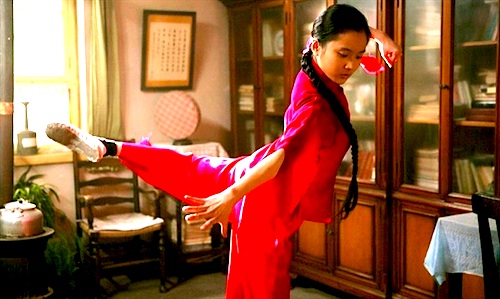By Joe Bendel. Most ballets tell tragic stories, but the Maoist-era Red Detachment of Women caused them. It certainly contributed to the woes of Lu Yanshi’s family during the Cultural Revolution. Their wounds will never fully heal, even when he is finally “rehabilitated” and released from his prison camp in Zhang Yimou’s straight-up masterpiece Coming Home, which opens this Wednesday in New York.
Lu Yanshi was a college professor—and therefore a class enemy during the Gang of Four’s reign of terror. Further compounding his guilt, Lu escaped from his labor camp, finding the half-starved life of a fugitive more bearable. Naturally, the Communist Party responded by pressuring his family. Lu’s wife Feng Wanyu will bear any risk to protect him, but their daughter, Dan Dan, has absorbed too much of the omnipresent propaganda. She is a gifted ballet dancer, but she could very well lose the lead role in Red Detachment of Women she has worked so hard to win. Convinced to inform on her father, she learns the hard way what sort of opportunities are available to the children of traitors.
Gaining nothing, Dan Dan’s relationship with her mother is nearly irreparably poisoned. Unfortunately, the years Feng spends separated from Lu are not kind to her. By the time he is released, Feng is already suffering from mild dementia. Due to some cruel form of amnesia, she is unable to recognize Lu. Worse still, she sometimes mistakes her distraught husband for the predatory Officer Fang, who used Lu’s safety to extort sexual favors from Feng, like any good Communist would. However, Lu quickly reconciles with his deeply remorseful daughter.

If you think there is a better performance to be seen in a film this year than Gong Li’s turn-for-the-ages as Feng, you either have profoundly faulty aesthetic judgement or were simply even more struck by the achingly poignant dignity of Chen Daoming’s Lu. Watching Lu as Feng unknowingly tells him about himself is more devastating than a thousand Old Yellers getting shot. What they are doing is actually very complicated. They are playing scenes with each other in the moment, but also with each characters’ ghosts from the past. Yet they pull it off brilliantly. It is their work that leaves a lump in your throat, but Zhang Huiwen is still quite touching as the disillusioned Dan Dan—and also convincingly graceful in her dance scenes.
Frankly, Coming Home is not trying to be a political film, because the terrible implications of the Cultural Revolution need no belaboring. They are ever-present and inescapable. Instead, it is an exquisite tragedy, rendered with incredible sensitivity and humanism. Zhang has gone big with epics like House of Flying Daggers and made Fifth Generation-defining classics with Gong Li, like Red Sorgum and The Story of Qiu Ju, but with the perfectly balanced Coming Home he expresses the pain and confusion of hundreds of thousands of families on a painfully intimate canvas. If you only see one film this year, you want it to be Coming Home. Very highly recommended, it opens this Wednesday (9/9) in New York, at the Angelica Film Center downtown and the Lincoln Plaza uptown.
LFM GRADE: A+
Posted on September 9th, 2015 at 5:29pm.